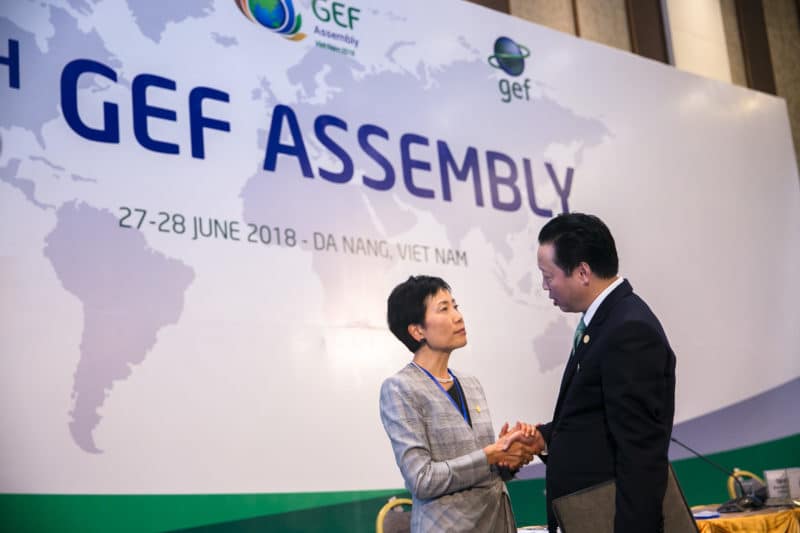The Global Environment Facility (GEF) Council has approved the Seventh Replenishment of the GEF Trust Fund (GEF-7) in the amount of $4.1 billion. This represents a slight drop from the $4.43 billion earmarked to GEF-6, and $4.34 billion to GEF-5.

The approval formed one of the major fallouts from the 54th meeting of the GEF Council convened in Da Nang, Viet Nam, from June 24 to 26, 2018. The three-day meeting brought together over 500 representatives of governments, international organisations and civil society organisations (CSOs).
The meeting also adopted several decisions, some of which are on:
- the GEF Gender Implementation Strategy, which aims to mainstream gender in the design, implementation, and evaluation of GEF programmes and projects;
- the updated Co-Financing Policy, with a new overall co-financing ratio of 7:1;
- the GEF Partnership;
- updating the System for Transparent Allocation of Resources (STAR); and
- the 2019 GEF Business Plan and Corporate Budget.
Following the Council meeting, the sixth meeting of the GEF Assembly was held on Wednesday and Thursday June 27 to 28 2018, with the Assembly taking note of the Report on the GEF-7 Replenishment; Sixth Overall Performance Study of the GEF; and Report of the Scientific and Technical Advisory Panel. During the two days, over 1,100 participants met in parallel roundtable sessions to discuss how to accelerate action on issues such as, amongst others: food, land-use and restoration; sustainable cities; blue economy; partnerships for implementing the 2030 Agenda; science-based targets for the Earth; circular economy; and marine plastics.
In her comments on the GEF-7 replenishment, Naoko Ishii, GEF CEO and Chairperson, characterised the replenishment as being the “best possible outcome of long and difficult negotiations,” and stressed that the resources allocated to the various focal areas must be maximised to yield the highest quality results over the next four years.
The GEF is funded by donor nations, which commit money every four years through a process called the GEF replenishment. Since its creation in 1991, the GEF Trust Fund has been replenished by $2.75 billion (GEF-1), $3 billion (GEF-2), $3.13 billion (GEF-3), $3.13 billion (GEF-4), $4.34 billion (GEF-5), and $4.43 billion (GEF-6).
The GEF Assembly has convened six times: April 1 to 3, 1998 in New Delhi, India; October 16 to 18, 2002 in Beijing, China; August 29 to 30, 2006 in Cape Town, South Africa; May 25 to 26, 2010 in Punta del Este, Uruguay; May 28 to 29, 2014 in Cancún, Mexico; and June 27 to 28, 2018 in Da Nang, Viet Nam.
The GEF was created in 1991 to formulate financing responses to the mounting concern in the preceding decade over global environmental problems. The GEF operated in a pilot phase until mid-1994. Negotiations to restructure the organisation were concluded at a GEF participants’ meeting in Geneva in March 1994, where representatives of 73 countries agreed to adopt the GEF Instrument.
Funding from the Facility has been channelled to recipient countries through 18 “GEF Agencies” also known as Accredited Entities: the UN Development Programme (UNDP); UN Environment (UNEP); World Bank; Food and Agriculture Organisation of the UN (FAO); UN Industrial Development Organisation (UNIDO); African Development Bank; Asian Development Bank (ADB); European Bank for Reconstruction and Development (EBRD); Inter-American Development Bank; International Fund for Agricultural Development; World Wildlife Fund, Inc.; Conservation International; International Union for Conservation of Nature (IUCN); Development Bank of Southern Africa; Brazilian Biodiversity Fund; Chinese Foreign Economic Cooperation Office; Development Bank of Latin America; and West African Development Bank.
The GEF also serves as the financial mechanism for several multilateral environmental agreements (MEAs), including the:
- Convention on Biological Diversity (CBD);
- UNFCCC;
- UN Convention to Combat Desertification (UNCCD);
- Stockholm Convention on Persistent Organic Pollutants; and
- Minamata Convention on Mercury.
